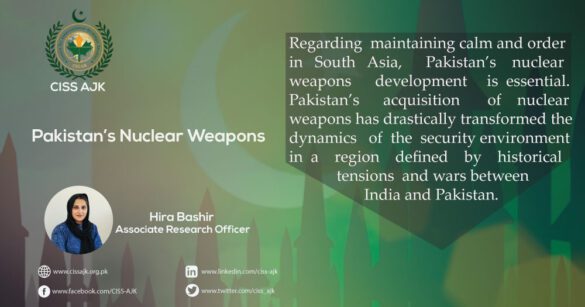795
Regarding maintaining calm and order in South Asia, Pakistan’s nuclear weapons development is essential. Pakistan’s acquisition of nuclear weapons has drastically transformed the dynamics of the security environment in a region defined by historical tensions and wars between India and Pakistan. The nuclear arsenal of Pakistan helps to keep tranquility in South Asia. Pakistan has no belligerent intentions against any other country; hence, they help maintain placidity in the area.
Pakistan has nuclear weapons primarily to obviate any possible assault from India. Pakistan’s nuclear deterrent aims to avert its larger and conventionally superior neighbor from launching a military attack against Pakistan. India is deterred from taking moves that may lead to a full-scale confrontation due to the threat of devastating nuclear retaliation. Pakistan’s nuclear arsenal balances out India’s conventional military dominance, creating a more even playing field and reducing the probability of aggressive military action by India. The security situation is more stable since neither party can gain an overwhelming military advantage without triggering catastrophic repercussions.
Pakistan’s possession of nuclear weapons coerces India to exercise prudence in South Asia. India has a compelling interest in avoiding a nuclear exchange because of the devastation it would cause to civilians and the environment. The risk of any escalation quickly spiraling out of control and leading to an unthinkable catastrophe incentivizes India to pursue diplomatic solutions and avoid reckless military adventurism.
Nuclear weapons provide a level of stability between India and Pakistan during heightened tensions or crises. Pakistan’s nuclear deterrence forces both nations to exercise strategic restraint and logical decision-making. It compels leaders to consider the consequences of their actions, making them less likely to make rash choices that could worsen the situation.
The world closely monitors the issue of nuclear weapons in South Asia. Increased international efforts have been made to foster conversation, mediation, and conflict resolution between India and Pakistan as the dangers of a nuclear confrontation in the region have been more widely recognized. The international community should make an effort to resolve long-standing issues between Pakistan and India, such as the Kashmir issue. By taking a stand and actively working towards a resolution, both countries would have fewer reasons to engage in conflict. With the support of the international community and other powerful nations, there is an increased incentive for the two countries to settle their differences amicably.
Pakistan’s nuclear weapons program has engendered strategic stability, making the region more predictable. Decision-makers are aware of the potential implications and are compelled to explore diplomatic and non-aggressive solutions to crises, knowing that a significant military attack could trigger a nuclear retaliation. This stability reduces the likelihood of a catastrophic war breaking out due to a mistake or unintentional deployment of nuclear weapons.
Nuclear weapons help maintain peace and security in South Asia, which is why Pakistan possesses them. Pakistan’s nuclear weapons program has deterred major conflicts and promoted a more peaceful environment in the region by providing a credible deterrent against potential aggression, maintaining a balance of power, controlling escalation, fostering crisis stability, attracting international mediation, and establishing nuclear stability. However, India and Pakistan must continue to engage in dialogue, implement confidence-building measures, and make diplomatic efforts to resolve their differences.
Hira Bashir
The writer is a researcher working on emerging technologies, nuclear politics and new trends in warfare.



